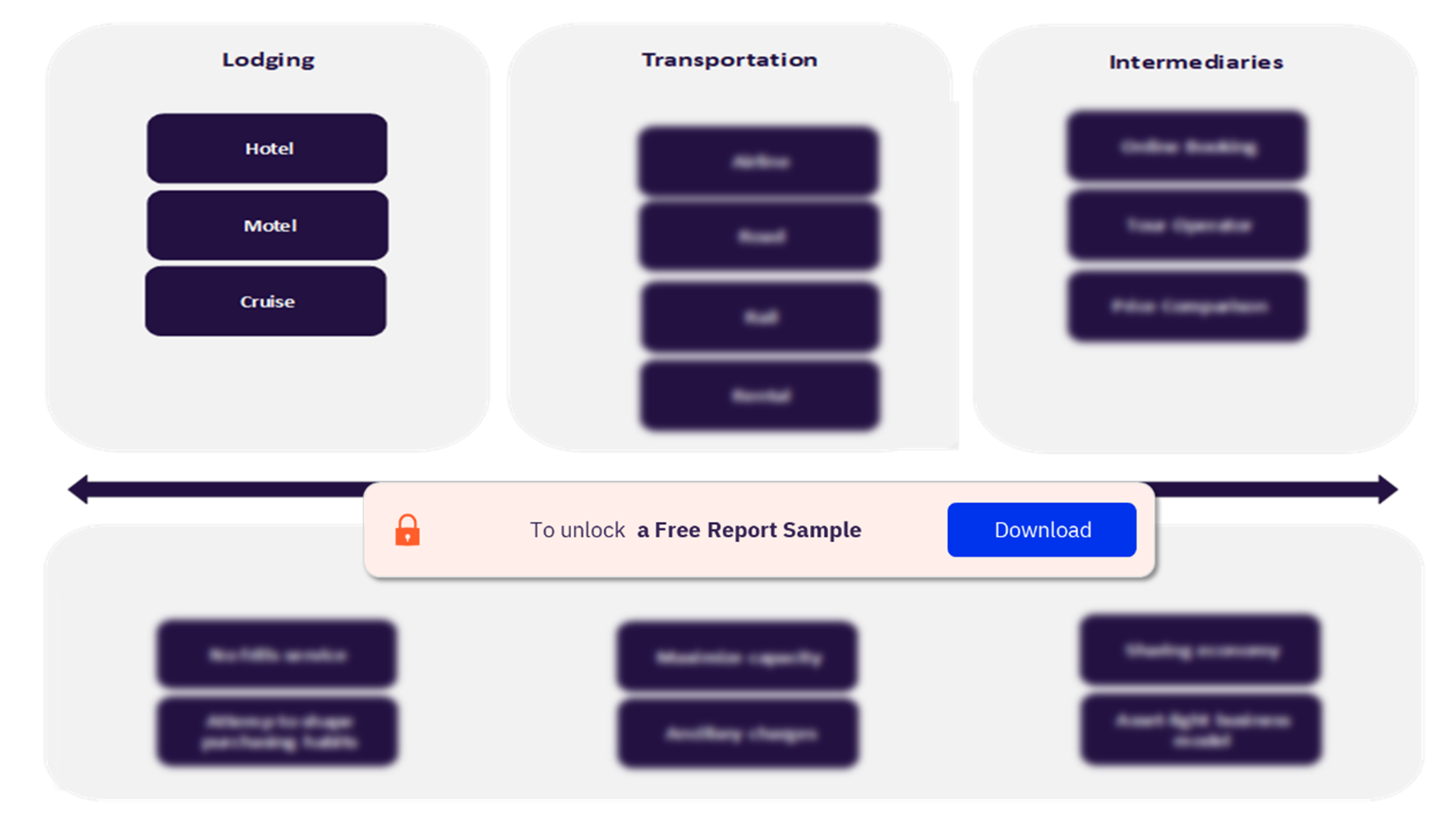Low Cost Evolution Travel and Tourism – Thematic Intelligence
Powered by ![]()
All the vital news, analysis, and commentary curated by our industry experts.
Low-Cost Evolution Travel and Tourism Thematic Report Overview
Travel companies are targeting a wider range of customers as airfares and hotel tariffs have become affordable in recent years. The travel industry now encompasses every type of traveler, and this has resulted in the rising popularity of low-cost travel and tourism operators. Travel apps such as Airbnb and Uber have been at the forefront of the low-cost evolution. These apps shape travelers’ spending habits by sending push notifications regarding last-minute deals while providing personalized travel itineraries. The asset-light business models of these firms have resulted in low prices being offered to the market.
The low-cost evolution travel and tourism thematic intelligence report provides a comprehensive understanding of the low-cost evolution theme and its impact on the travel and tourism industry. It covers the emerging trends that will shape the theme over 12-24 months. In addition, the report provides low-cost evolution value chain insights, and the key players making their mark within the theme.
| Key Trends | · Technology Trends
· Macroeconomic Trends · Regulatory Trends · Industry Trends |
| Key Value Chain Components | · Lodging Suppliers
· Transportation Suppliers · Intermediaries Suppliers |
| Leading Public Companies | · Accor
· Airbnb · Booking Holdings · Carnival Corporation · easyJet · Expedia |
| Leading Private Companies | · Best Western
· BlaBlaCar · Citymax Hotels · Flixbus · Motel 6 |
| Enquire & Decide | Discover the perfect solution for your business needs. Enquire now and let us help you make an informed decision before making a purchase. |
Low-Cost Evolution Travel and Tourism – Key Trends
The main trends that will shape the low-cost evolution theme in the travel and tourism industry can be classified into technology trends, macroeconomic trends, regulatory trends, and industry trends.
Technology Trends: Constant growth in internet users, low-cost suppliers of transportation and lodging in the tourism industry continuously generating big data for their dynamic pricing strategies and an increase in deployment of AI in online travel are a few technology trends likely to shape the low-cost evolution theme in the travel and tourism industry.
Macroeconomic Trends: The impact of COVID-19 particularly among the Millennials and Gen Z, and the growing focus on ESG are expected to impact the low-cost evolution theme at the macroeconomic level.
Regulatory Trends: Tourist taxes and liberalization of specific LCC markets are the regulatory trends expected to impact the low-cost evolution theme in the travel and tourism industry.
Industry Trends: Low-cost long-haul, off-peak travel, psychocentric tourists, and travel apps are the industry trends impacting the low-cost evolution theme.
Buy the Full Report for More Insights on the Key Trends Impacting the Low-Cost Evolution Travel and Tourism Theme, Download a Free Sample Report
Low-Cost Evolution Travel and Tourism – Industry Analysis
Direct booking channels are a popular choice for booking with both lodging providers and airlines. These channels are important for both airlines and hotels to reduce the cost of paying a commission to third-party suppliers. This allows firms to pass these savings directly to the customer in the form of lower prices.
The low-cost evolution travel and tourism thematic report also covers:
- Use cases
- Timeline
- Signals
- M&A trends
- Company filing trends
- Social media trends
Buy the Full Report for Low-Cost Evolution Travel and Tourism Industry Analysis, Download a Free Sample Report
Low-Cost Evolution – Value Chain Insights
The low-cost evolution value chain has three main segments, lodging suppliers, transportation suppliers, and intermediaries suppliers.
Lodging: In the low-cost evolution theme, the three main types of lodging providers are hotels, motels, and cruise ships. Many major and independent hotels have realized the benefits associated with setting up a budget-focused brand or establishment, especially now, with many travelers becoming even more price-sensitive due to the pandemic. Motels often meet the needs of travelers needing the lowest cost possible for accommodation. Once reserved for wealthy travelers, cruise companies now cater to the low-cost market too. Many companies now offer all-inclusive deals that create value for money and fill mega-vessels with thousands of passengers.
Low-Cost Evolution Value Chain Analysis
Buy the Full Report for Low-Cost Evolution Value Chain Analysis, Download a Free Sample Report
Low-Cost Evolution Travel and Tourism – Competitive Landscape
The key companies making their mark within the low-cost evolution travel and tourism theme are:
Leading Public Companies: Accor, Airbnb, Booking Holdings, Carnival Corporation, easyJet, and Expedia are a few of the leading public companies adopting the low-cost evolution in the travel and tourism industry.
Leading Private Companies: Best Western, BlaBlaCar, Citymax Hotels, Flixbus, and Motel 6 are a few of the leading private companies adopting the low-cost evolution in the travel and tourism industry.
Leading Companies in the Low-Cost Evolution Travel and Tourism Theme
Buy the Full Report for Company-Wise Insights into the Low-Cost Evolution Travel and Tourism Theme, Download a Free Sample Report
Scope
- This thematic report provides an overview of the impact low-cost evolution theme has on the travel sector and seeks to understand some of the contributory factors.
- The key trends within this theme are split into technology, macroeconomic, regulatory and industry trends .
- Several case studies are included to analyze the multiple ways countries and companies have responded to the impact of this theme’s growth and what they are doing to grow with this theme.
Key Highlights
Travel, especially international travel, was once confined to the wealthy. But as airfares have decreased and hotels have become more affordable, travel companies have been able to target a wider range of customers. The industry now encompasses every type of traveler, and the rise in the popularity of low-cost operators is likely to continue. As financial constraints continue to be present, consumers will increasingly look for ways to reduce their spend and low-cost evolution has opened up travel to the masses. When comparing GlobalData’s Q3 2022 Consumer Survey to its Q3 2023 Consumer Survey, the level of ‘extreme concern’ from global respondents over their personal finances only changed by one percentage point, from 30% to 31%. This minor change shows that a substantial segment of the global traveler market will continue to look for low-cost options as international travel continues to become more accessible in 2023.
Travel apps have been heavily adopted by tourism-related companies operating in the low-cost market. Low-cost companies that are not developing and investing in app technology stand to become laggards within their respective sectors. Apps shape travelers’ spending habits by sending push notifications regarding last-minute deals while allowing for personalization. Advancements in technology have seen a rise in the popularity of the sharing economy. The sector has changed the way travelers book trips and the business model poses a threat to many different operators. Airbnb and Uber have revolutionized the interaction between buyers and sellers and the asset-light business models these firms have adopted have resulted in low prices being offered to the market. Internally, apps reduce overheads by instantly solving customer queries with ‘frequently asked questions’ sections and allowing companies to create competitive advantages by displaying innovation through their app development, such as by incorporating advanced technologies like AI.
Low-cost evolution first happened within the aviation sector and has now occurred across the majority of the travel and tourism sector. There is a magnitude of different ways firms can make cuts to become low-cost. Car hire firms have removed navigation devices from vehicles and offer economy option cars. Hotels have diversified to offer basic hotel rooms offering the bare necessities in a smaller room with fewer amenities.
Reasons to Buy
- Understand the current low-cost evolution trends within the travel landscape today and how these will escalate soon.
- Assess how travel and tourism companies such as tour operators, OTAs, and DMOs are utilizing low-cost evolution to drive revenues.
- Acknowledge the potential pitfalls of using low-cost evolution by understanding the social, cultural, and environmental effects on the destination.
- Discover recommendations for businesses involved in low-cost evolution
- GlobalData’s thematic research ecosystem is a single, integrated global research platform that provides an easy-to-use framework for tracking all themes across all companies in all sectors. It has a proven track record of identifying important themes early, enabling companies to make the right investments ahead of the competition and secure that all-important competitive advantage.
- Across the travel and tourism supply chain, now have an opportunity to capitalize on low-cost evolution, and there are notable examples of this. Therefore, all should buy this report to fully understand how this theme will continue to be a key theme in the future travel landscape.
Airbnb
America's Best Value Inn
Amtrak
Avis
Balkan Holidays
Best Western
BlaBlaCar
Booking Holdings
Carnival Corporation
Choice Hotels
Citymax Hotels
Curb
Deutsche Bahn
Didi Chuxing
easyHotel
easyJet
easyJet Holidays
Enterprise Rent-A-Car
Europcar
Eurostar International
Expedia Group
Fareportal
First Group
Flixbus
Gocompare.com
Google Flights
Great Value Vacations
Hertz
Hostelworld
IHG Hotels & Resorts
IndiGo
Jameson Inn
Jet Blue
Jet2Holidays
Lastminute.com Group
Localiza
Lumo
Lyft
Moneysupermarket
Motel 6
MSC Cruises
On the Beach
OYO Rooms
Red Roof Inn
Royal Caribbean International
Ryanair
Scoot
Sixt
Southwest Airlines
The Motel One Group
Travel Republic
Trip.com Group
TripAdvisor
TUI Group
Turo
Uber
Vueling
Whitbread
Wizz Air
Wyndham Hotels & Resorts
Table of Contents
Frequently asked questions
-
What are the key trends shaping the low-cost evolution travel and tourism theme?
The main trends that will shape the low-cost evolution theme in the travel and tourism industry are technology trends, macroeconomic trends, regulatory trends, and industry trends.
-
What are the key components in the low-cost evolution value chain?
The low-cost evolution value chain has three main segments, lodging suppliers, transportation suppliers, and intermediaries suppliers.
-
Which are the public companies in the low-cost evolution in travel and tourism theme?
Accor, Airbnb, Booking Holdings, Carnival Corporation, easyJet, and Expedia are a few of the leading public companies adopting the low-cost evolution in the travel and tourism industry.
-
Which are the leading private companies in the low-cost evolution of travel and tourism theme?
Best Western, BlaBlaCar, Citymax Hotels, Flixbus, and Motel 6 are a few of the leading private companies adopting the low-cost evolution in the travel and tourism industry.
Get in touch to find out about multi-purchase discounts
reportstore@globaldata.com
Tel +44 20 7947 2745
Every customer’s requirement is unique. With over 220,000 construction projects tracked, we can create a tailored dataset for you based on the types of projects you are looking for. Please get in touch with your specific requirements and we can send you a quote.
Related reports
View more Travel and Tourism reports












